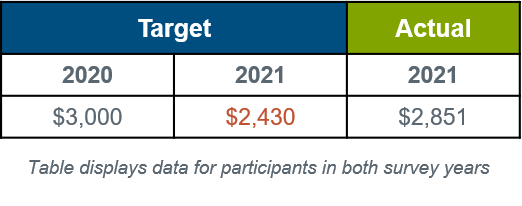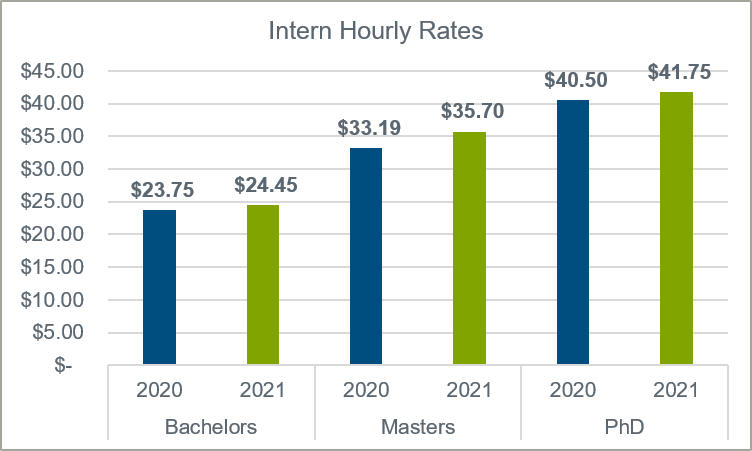
Advisor Blog | May 2021
Starting Pay for College Graduates Perseveres During the COVID-19 Pandemic
What happened to pay for recent grads and interns in 2020? The data tells an interesting—and perhaps surprising—story.
Pearl Meyer began collecting data for its 2020 College Graduate and Intern Compensation Survey on January 15th, 2020, five days away from the country’s first identified case of COVID-19. The data covered hiring and compensation information for the 2019 calendar year, meaning that, while informative, the report did not reflect the circumstances that would occur as a result of COVID-19.
Skip ahead to January 15th of this year, when the world looked quite different and Pearl Meyer’s 2021 College Graduate and Intern Compensation Survey opened for participation, collecting 2020 data. This time period was consumed by the events of COVID-19 and its effects on college graduate and intern hiring. Despite all the change that occurred between the reports for these two years, the data captured for those that participated in both tells a story of perseverance.
College Graduate Hiring
Hiring and pay rates for college graduates were up slightly in 2020 compared to 2019. The median number of graduate hires per company was up from 99 in 2019, to 103 in 2020, and pay for college graduates was also up by 1.8%. This was quite surprising given the concern for college job seekers during the pandemic, and provides hope for them as we come out of it. The value of short-term, or annual, incentive awards for college graduates displayed a similar trend, with the value in the 2019 data being slightly higher. The median value of annual incentive awards in Pearl Meyer’s 2020 statistics was $2,851, compared to a median value of $3,000 in 2019. Even the value of signing bonuses was similar, with the median value of graduate signing bonuses (for those that were awarded one) being $3,000 in both the 2020 and 2019 data.
According to our 2020 statistics, what was affected for college graduates by the pandemic were short-term incentive target values and the use of sign-on bonuses. The median short-term incentive target value in 2020 was $2,430, down from a median value of $3,000 in 2019. This is even below the actual value of the median award amount provided, and this can be attributed to the uncertainty compensation departments faced when setting these values. During the pandemic, companies were concerned about bonus pools, and were not willing to set bonus targets that they may not be able to pay out. As for signing bonuses, 31.6% of graduate hires were provided one in 2019, compared to 26.2% in 2020. Signing bonuses are typically used in “tight” markets, where there is more competition (or perceived competition), and they do not want top talent to hold out for a potentially more lucrative offer. With COVID-19, college graduates were more willing to accept first offers, meaning signing bonuses did not need to be used as often to attract top talent.

Intern Hiring
Interns in 2020 saw a larger impact from COVID-19, as the number of intern hires per company was 49, as compared to 76 in 2019. This was to be expected—back in late April of 2020, Glassdoor stated that 52% of internship openings had been closed between March 9th and April 13th of that year. However, according to our survey, most companies plan to hire the same number of interns in 2021 as they did previously, and most plan to be remote or partially remote. Despite a reduction in the number of internships, intern pay rates rose by 3.3%, and rose consistently for each degree level.

The data presented in the 2021 College Graduate and Intern Compensation Survey report appears to reflect some stability in the entry-level market. Some measures, like intern hiring rates, were clearly affected by the pandemic. However, even these are in the process of recovering based on responses to the survey’s policies and practices questionnaire, which indicated that companies expect to hire interns at pre-COVID-19 levels. We are also beginning to see that new graduate hires are not just “nice-to-have” for companies. They are instead an essential addition, as companies need to keep pace in an ever-evolving world and economy. As the world continues to adapt to life after the pandemic, new graduates and those working on obtaining their degrees should thrive with newfound flexibilities in workplace culture, changes to leisure time hobbies and habits, and societal changes.
For more information, please check out the full 2021 College Graduate and Intern Compensation Survey prospectus. The report serves as a valuable benchmarking resource to compare your company’s pay practices to the rest of the market with detailed policies and practices information, and compensation data for over 200 graduate and intern degrees.
To purchase a copy of the survey report, click here and contact the survey team for information on participating in this year’s survey.
